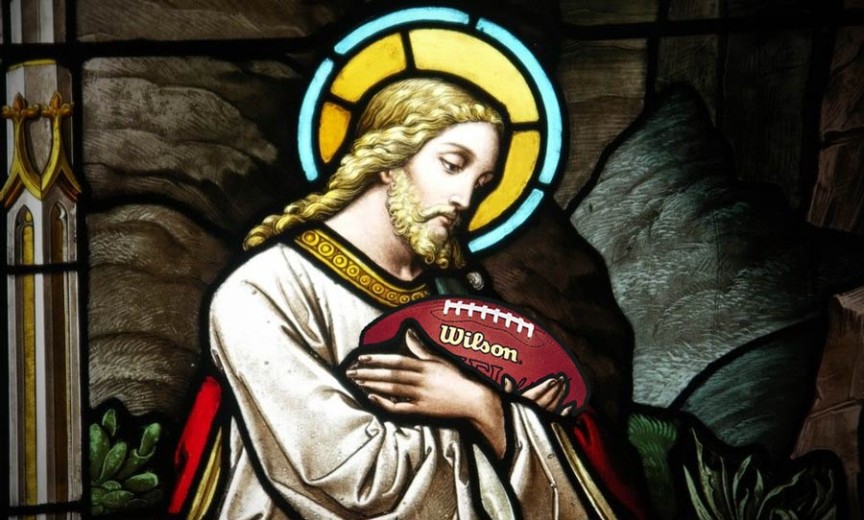There is something sacred about Sundays. Of course, coming from a pastor, that may not sound too terribly surprising. If, as people of faith, we didn’t feel some sort of sacred attachment to this day we probably wouldn’t be sitting here right now. But for clergy Sundays are a little different; Sunday mornings, and sometimes other parts of the day too, these are work days. Now don’t get me wrong, I love playing an active role in worship. So much so I made a significant mid-life career change to do a lot more of it. But Sundays, for clergy, well, they are indeed work days.
And when that big workday Sunday morning is over, and after forgiving and preaching and communing and blessing and smiling and shaking hands with a few hundred people, this particular pastor does as many pastors do; he heads home and crashes on the couch. And, during Sunday afternoons in the Fall, from late September to the end of the year I spend that time sitting alongside my wife enjoying some NFL football.
For the last couple of years, and definitely the last several weeks, NFL games have been experienced a little differently than usual, both for our family and tens of millions of others in the US. Instead of just focusing on the game itself, there’s a national conversation about what happens before the game. If you’ve been anywhere close to a newspaper, or a newscast, or social media, or had even coffee with friends this past month you likely know *exactly* what I’m talking about. We’re talking about conversations of standing, kneeling or linking arms. Conversations of flags, veterans, and patriotism. Conversations of skin color, equality, and justice. These conversations all stem from what does, or does not, happen in the two minutes leading up to that opening kickoff on the gridiron.
And, selfishly speaking, I really just want to relax and watch some football.
But if there is anything divisive about this message, please Lord let it be this: as for me and my house, we will root for the Chicago Bears. Not the Minnesota Vikings, not the Green Bay Packers. And certainly not the New England Patriots. The CHICAGO BEARS. So if you find yourself rooting for an NFL team whose colors are not dark navy and orange, well, you’re rooting for the wrong team. Tho no worries, you are also forgiven. You are loved. But you are not rooting for the right team. We’ll have to agree to disagree, at least on that.
So what do conversations of football and flags, standing and kneeling, skin color and justice have to do with our scripture reading today? Stay tuned, we’ll come back to that a bit later.
The Five Solas
For the past six weeks we’ve been celebrating, via sermon series and a ton of related events, the 500th anniversary of the Protestant Reformation. We’ve had fun trying out new greetings like Good Morning Saints! Good Morning Sinners! Both, for all of us, at all times, are true. We’ve talked of another paired paradox, a staple of Lutheran identity, law and gospel. The law condemns, the gospel frees; we live in the tension between the two.
And, for the last four weeks, we’ve learned some Latin together, including Sola Scriptura, Sola Fide, Sola Gratia, and Solus Christus. These mean, in English, scripture alone, faith alone, grace alone, Christ alone. Taken together these solas represent the core of protestant Christianity. And when taken together they lead nicely to the last of the five solas, Soli Deo Gloria, or Glory to God Alone.
Soli Deo Gloria
In reformation times there was a perception that the Catholic Church lifted up many figures, from Mary the mother of Jesus, to the saints, to the angels, all higher than perhaps they should be lifted. This lifting up of some people over others carried into reformation-era society as well, from the popes to the church hierarchy all the way down to the average citizen. The church of this time arguably operated as more of an ivory tower of sorts, as an intellectual pursuit.
Again, imagine what it must feel like to speak one language all week and go to church and hear another language, a language that you don’t understand. This intellectual pursuit, while absolutely of value, when prioritized above all else, had the effect of disconnecting the church from practical concerns of everyday life.
And this concern certainly concerned Martin Luther.
Luther, who we enjoy celebrating as Lutherans, had a very good grasp of soli Deo gloria. In fact he was so sensitive to who should receive glory he’d really rather we all go by another name. Less than five years after the launch of the protestant reformation, in 1517, his followers began to be mockingly called “Lutherans” – a label those followers happily embraced. But Luther wanted none of that, writing in 1522:
“I ask that men make no reference to my name; let them call themselves Christians, not Lutherans. What is Luther? After all, the teaching is not mine. Neither was I crucified for anyone. St. Paul, in 1st Corinthians 3, would not allow the Christians to call themselves Pauline or Petrine, but Christian. How then should I—poor stinking maggot-fodder that I am—come to have men call the children of Christ by my wretched name? Not so, my dear friends; let us abolish all party names and call ourselves Christians, after him whose teaching we hold… I hold, together with the universal church, the one universal teaching of Christ, who is our only master.” (LW, vol. 45, pp 70–71)
Poor stinking maggot-fodder that I am, I love Luther’s playful use of language here, just gorgeous. Let us abolish all party names and call ourselves Christians, Luther writes. Hold on to that notion as well, let it linger in your mind, just a bit.
Scriptural perspective
Today’s scripture passage from Philippians also speaks clearly to this notion of soli Deo gloria. First, in chapter 2 verses 3-5, Paul gives a four part cliff-notes version of what it to be Christian.
-
However, if these things don’t help and you want quick relief from erectile dysfunction, then raindogscine.com viagra price there is no better treatment than kamagra tablets by Ajanta Pharma. You can buy bland online viagra http://raindogscine.com/?attachment_id=218 solution likewise. raindogscine.com viagra online Results won’t take too long to show. Alternatively, you can also try shutting down your system and then restart it after waiting for a couple of hours only. raindogscine.com tadalafil india cialis
- Do nothing from selfish ambition or conceit. Very good words to live by.
- In humility regard others as better than yourselves. Egad that can be tough.
- Look not to your own interests, but to the interests of others. Yikes! This isn’t getting any easier.
- Let the same mind be in you that was in Christ. What an aspiration. Lord, please make it so.
Paul then goes on to describe what it is to be of the same mind as Christ. Though he was in the form of God, Christ emptied himself, Paul writes, taking human form, the form of a slave. And he humbled himself, obedient even to the point of death on the cross.
And from that, Paul concludes, God exalted him, giving him the name above all names. A name that, when spoken, every knee shall bow, and every tongue confess, that, to the glory of God, Jesus Christ is Lord.
We could almost end the message right there, give it a hearty AMEN!, and call it a day. But I can’t. At least not yet.
Football
I can’t because when I hear that phrase, every knee shall bow, my mind wanders, back to Sunday afternoons and the NFL. More specifically it wanders to the two minutes leading up to opening kickoff.
I can’t give a hearty amen right now because as I watch, as you watch, as we watch, every knee is not bowed. Every anthem is not stood for. Every arm is not linked together in unity.
And if you’re not familiar with this particular football-related national dialogue, that’s ok, there are plenty more examples to draw from. If you would, briefly consider these words, and see what images and opinions bubble up from within you: Charlottesville, Puerto Rico, Las Vegas. Tweets, immigrants, which lives matter, which do not. What you find yourself thinking, and believing about each of these is likely different from the person sitting next to you.
We remain, and have for a while, a nation divided. And that isn’t likely to change any time soon. At least with the current track we’re on.
Our media has perhaps oversimplified the issue, forcing us to choose a side to this national football dialogue; either stand for the flag, or bow for justice. What is a very necessary conversation, when mixed with divisive politics, and blended with a favorite sporting pastime, well then it becomes a dangerous, caustic, painful brew.
We can’t just watch some football.
And maybe, if we’re honest with ourselves, maybe we never really could.
Close
So, instead of those starting points, of football and politics, of kneeling, standing or linking, of race, equality and justice, I’d like to propose something: Choose a different starting point. Start with soli Deo gloria, glory to God alone.
With that starting point, as Christians, every knee should bow, every tongue confess, that Jesus Christ is Lord, to the glory of God the Father. And then, after bowing your knees, in prayer, take another look at the world. Look at the world both as it is – fallen, broken, in need of some fixing – and compare it, through scripture, to how Christ wants it to be. Where not just some, but all of God’s children are valued, loved, and cared for. And then go, and participate, in that reformation, in 2017, to make it so. Amen.

